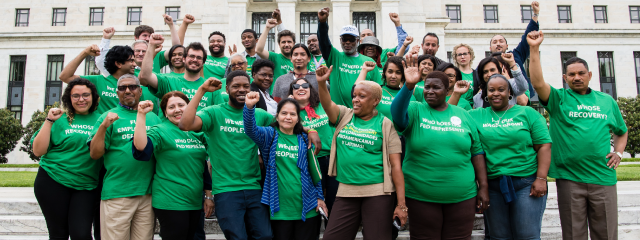Blog
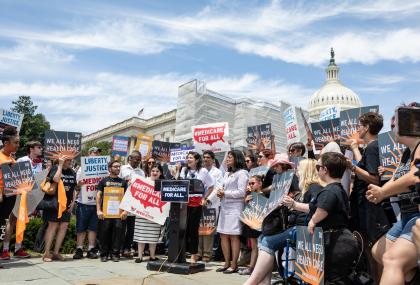
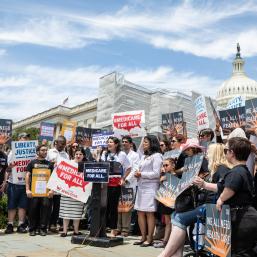
One of the most grievous problems facing people in this country is inadequate healthcare and skyrocketing costs. In the United States today, 30 million people are uninsured while another 40 million are underinsured. CPD Network affiliates and allies have been on the frontlines of the fight for affordable healthcare – first to pass the Affordable Care Act and now to champion Medicare for All Act. Medicare for All, the only truly single-payer, universal healthcare system, guarantees that healthcare is a right and enables every person living in the United States to receive the healthcare they need to survive and thrive.
Ady Barkan, a Senior Organizer at CPD, has spent the last three years advocating for Medicare for All after he was diagnosed with ALS, a disease that slowly takes away nearly every physical function while keeping the mind intact. Since his diagnosis, Ady has become arguably the most influential activist in America. Many first heard about him after he confronted then Senator Jeff Flake on an airplane in December 2017. Barkan has now been arrested at the Capitol in Washington more than half a dozen times, showing by example how to fight injustice, and most recently spoke with a number of presidential nominees about supporting Medicare for All. Ady’s work has been featured in The New York Times, The Washington Post, CNN, TIME, The Nation and many other major media outlets.
Ady just released Eyes to the Wind: A Memoir of Love and Death, Hope and Resistance, where he shares how living with ALS reaffirmed his commitment to activism and looks back at his early days working in social justice. Ady also speaks about the highs and lows of starting a family while dealing with terminal illness.
The moral clarity of Ady’s message—and the power of his example, a dying man standing up for millions of others—has had a lasting impact on this country. Even as his illness has progressed and he has become unable to speak, his voice has boomed loudly in the struggle to protect immigrants under siege, to try to stop Brett Kavanaugh’s nomination to the Supreme Court, and now to make sure that in our country, healthcare is a human right.
There is only one form of universal health care that covers everybody, without exception, and lowers overall health care expenditures. It is time for Medicare for All. Interested in joining the fight for Medicare for All? Share your healthcare story here and one of our organizers will reach out!
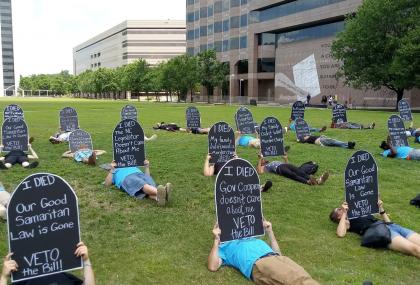
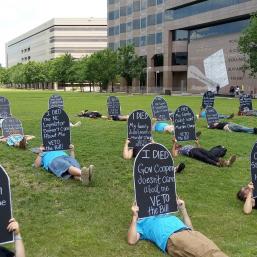
Today is International Overdose Awareness Day. As we acknowledge the grief felt by families and friends remembering those who have died from a drug overdose, it’s also time to acknowledge and address the opioid epidemic as a public health issue, not a criminal justice problem.
One such effort is #ReframetheBlame, a collaboration with Drug Policy Alliance and the Women’s Urgent Action Fund that seeks to combat drug-induced homicide laws that punish people selling drugs that lead to accidental overdoses. People sentenced under these laws often do as much time as those sentenced to manslaughter or murder. The harsh laws are aimed at deterring drug distribution, but as our partners at Drug Policy Alliance explain, “research consistently shows that neither increased arrests nor increased severity of criminal punishment for drug law violations result in less use (demand) or sales (supply). In other words, punitive sentences for drug offenses have no deterrent effect.” Instead, these policies are drawing more and more people into the criminal justice system for non-violent offenses, and brown and black communities are being disproportionately affected. #ReframetheBlame is a call to action to amend these practices.
Our country’s overdose epidemic is exacerbated by our continuous failure to pioneer courageous policy that prioritizes life and health over punishment and retribution. We are fighting against the continued incarceration of nonviolent drug users and reactionary policies. We cannot incarcerate our way out of a public health crisis., We say no more to deadly drug policy which has never shown any effectiveness. We call for our leaders to act responsibly using science and proven policies.
More people are going to die if we continue business as usual. We demand our government adopt drug policies based in science and grounded in harm reduction principles, not tough-on-crime policing. One such evidence-based approach to the opioid crisis is the Comprehensive Addiction Resources Emergency (CARE) Act. Introduced by Senator Warren and Congressman Cummings, the bill would invest $100 billion over the next ten years in prevention, treatment, and recovery, setting up planning councils at the local level comprised of people directly affected by the epidemic. Every Democratic Senator running for President has come out in support of the bill. Republicans in Congress should do the same. This is a bipartisan problem that needs bipartisan solutions, and the CARE Act is a necessary, common-sense approach to ending this crisis.
This International Overdose Awareness Day, let’s continue to destigmatize drug use, invest in harm reduction, and shift our focus from policing and incarceration to common-sense public health solutions.
---
Robert and Louise are members of the Urban Survivors Union, a national drug user union that provides strategies and technical assistance to organizations who are struggling to truly center the voices of the people most directly impacted by drug overdose. It is the only national union of drug users in the country.
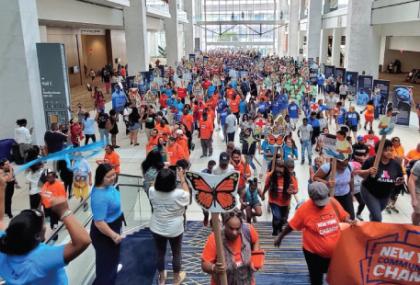

CPD’s People’s Convention brought over 1,500 leaders and members of our affiliate network to Detroit for three days of action, planning, and joint mobilizing for the fight ahead. We invited members from Churches United for Fair Housing (CUFFH) and SPACEs to reflect on their experiences, gathering with the largest progressive organizing network in the country.
CUFFH Member Jameal Starks Asks ‘What’s An Activist?’
What’s an activist? That was the question on my mind before I went to the Center for Popular Democracy’s 2019 People’s Convention. Is it someone with a master’s degree in Political Science?
I know now: it’s anyone willing to stand up to unfairness. This is just one of the many things I learned and experienced at the convention.
The whole Churches United for Fair Housing (CUFFH) team, CUFFH Youth, and members of our community took a bus to Detroit, Michigan for the People’s Convention. We heard from speakers such as Linda Sarsour and U.S. Representative Rashida Tlaib, took it to the streets with a march, and exchanged ideas through workshops with like-minded leaders from communities all around the country.
I found the People’s Convention to be very empowering and uplifting, especially if you’ve ever felt alone in your personal struggles. It was amazing to come to an event with people just like me who were experiencing victories over unfairness in their community. All of the activities, from the march to show that “Detroit’s Fight Are All of Our Fights,” the guest speakers and direct questions to conversations all made the People’s Convention a very empowering event.
SPACEs Member Chioma Oruh Feels She ‘Found Her Tribe’
I’ve had some time now to digest the many great lessons learned at the Center for Popular Democracy’s (CPD) Our Vision, Our Future: People’s Convention held in Detroit, MI from July 25-27th. In the time since coming home, and post watching the Democratic primary debates that also took place in Detroit shortly after the convention, I’ve had some time to reflect on the significance of this convention both personally and politically.
Personally, I feel like I’ve found my tribe. It was such an empowering opportunity to bring so much of what I personally identify with and give it a platform. I had joined SPACES a few months back, when I was introduced to the Executive Director, LaDon Love. And I simply fell in love with the mission and vision of this organization. In working together on the Birth to Three Campaign, I also learned the unique value of SPACES, as an affiliate organization of CPD.
CPD carries out its mission of building organizing power to transform the local and state policy landscape through deep, long-term partnerships with leading community-based organizing groups nationwide like SPACES in Action, which is the affiliate organization in Washington, DC. At the Detroit convention, I really ingested the power of their vision and how truly transformative this approach to organizing is. Read more of Chioma’s reflection here.


Recently, CPD worked with Make the Road Connecticut (MRCT) to launch a gallery walk that showcased the photography of members of MRCT's youth committee. The photographs were part of a community-based participatory research (CBPR) project funded by the Robert Wood Johnson Foundation and led by CPD Senior Research Analyst, Michele Kilpatrick, CPD Co-director of Community Dignity Campaigns, Julio Lopez (then executive director at MRCT), and Professor Julie Henly at the University of Chicago. Community-based participatory research (CBPR) is a form of research that recognizes the expertise and centrality of the lived experiences of communities. In such projects, members of the community are active participants in the development of research questions, research design, and implementation.
The main component of the project was a research method called photovoice, in which participants took pictures that illustrated their experiences, then joined group-discussion sessions focused on those experiences. After a few rounds of pictures and discussion sessions, participants chose the pictures they wanted to showcase, then decided how to showcase them. The youth selected three photos to be a part of a gallery walk and drafted sentences describing the meaning of those photos. The final project highlighted the challenges of immigrant families in a community facing disinvestment and white supremacist persecution as well as labor abuses.
The title, brochures, and format of the gallery were designed by the young people, working with local artist, Lindaluz Carrillo. On July 19, MRCT staff, members, family, and friends came together to see these pictures and learn from these young photographers. Congratulations to MRCT for a successful and fascinating project!


The fast-growing gig economy provides flexibility and opportunity for millions of workers and consumers. Billions of dollars are pouring into these platforms: Instacart’s revenues grew 75 percent over one year, and the company is now valued at over $7.6 billion. DoorDash is now valued at over $12 billion.
But the workers fueling the rapid expansion of app-based work experience low pay and tip theft, and due to their status as independent contractors they lack access to either employer-provided benefits or the public safety net. Our recent survey of hundreds of Instacart workers showed they earn an average of $7.66 an hour. Many workers put in long hours, others use gig work earnings to supplement their income from a conventional job, but all are relying on their gig income, derived through opaque and ever-changing pay structures, to meet basic needs.
For the past year, CPD has supported Working Washington in engaging thousands of gig workers at Postmates, DoorDash, Instacart, and Caviar. When Instacart workers reported a drop in pay late last year, we tapped into the informal digital spaces where workers congregate and collected data to show that Instacart had begun repurposing customers’ tips to pay wages. Since then we have engaged over 10,000 workers performing app-based food and grocery delivery—the largest base of non-driver gig workers in the country. Much of our engagement has grown organically from the online pay calculator we developed to help Instacart and DoorDash workers navigate these companies’ purposely opaque compensation systems. The pay calculator has enabled us to bring thousands of workers into the campaign and to collect the first national data on the income earned on these apps.
Working Washington executed an aggressive communications strategy that made national news and drove Instacart to change its pay model and pay restitution to its workers. Working Washington drove a similar campaign to pressure DoorDash to abandon its policy of using customer tips to offset, rather than add to, the compensation the company provides to drivers. After vocal criticism from workers and customers that garnered extensive media coverage, DoorDash recently committed to revising its pay practices.
Now Working Washington is scaling organizing efforts to win industry change, including through strategic engagement with platforms that seek to lead on “high road” labor practices, while developing a strategy to win transformative change through policy fights and mass mobilization of gig workers. Please make a donation today to support this critical fight for workers’ rights.
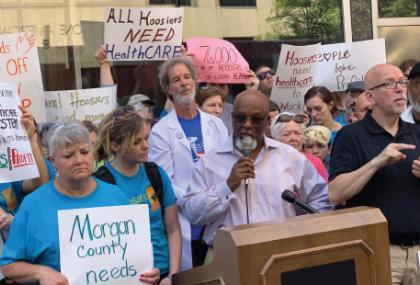
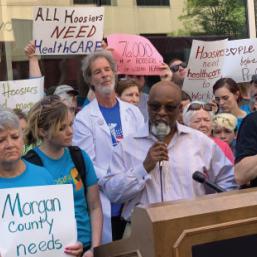
Founded in 2017 by a sixth generation Hoosier, Hoosier Action, a CPD affiliate, works to connect small town and rural Hoosiers to the broader fight for a multiracial democracy and to reject the myth of scarcity and racial animus. Hoosier Action builds small-town chapters in which members undergo intensive political education and take up fights to improve their communities.
Right now, and with CPD campaign support, Hoosier Action is building a multi-constituency, statewide aggressive campaign to end the Medicaid work requirements—a leftover policy from when Mike Pence was governor. Hoosier Action is organizing Medicaid patients, rural healthcare providers, hospital administrators, and mental healthcare workers as well as groups including the Concerned Clergy of Indianapolis, Faith in Indiana, Indiana Recovery Alliance, Communications Workers of America (CWA), and the Baptist Ministerial Alliance to fight together.
On July 1, the day the work requirements began, Hoosier Action led an action, held a press conference, and delivered thousands of postcards from 43 counties to Governor Eric Holcomb. Members are continuing in-district meetings with local officials and planning a large action in November. You can learn about the campaign in an Indianapolis Star video featuring Hoosier Action member Eva Guerrero. CPD is working with partners in 10 states to stop the implementation of work requirements for Medicaid, and we are supporting efforts in three states to expand Medicaid.
In partnership with the CWA, Hoosier Action is also developing a campaign aimed at the private companies that are making a profit while administering Indiana’s social safety net programs. To date, Hoosier Action has held seven teach-ins in rural counties and held weekly volunteer house visits, Wednesday work parties with membership, letter to the editor trainings, and story collection sessions.
In addition to fighting to protect meaningful benefits in Indiana, Hoosier Action is also fighting to keep people from getting sick. In Johnson and Morgan Counties, Hoosier Action members have been focused on a set of contaminated former industrial sites. Hoosier Action members are facing autoimmune disorders, children with cancer, and other terrifying health problems. But government officials have not taken any meaningful action. Hoosier Action is putting pressure on the Environmental Protection Agency (EPA) and the Indiana Department of Environmental Management to address the crisis. Members participated in the audit of EPA’s inaction, and some of the people most impacted their offered testimony. The result: The EPA has held community forums and increased transparency and accountability. In September, Hoosier Action will be organizing town hall meetings to train an additional 100 leaders and build community capacity to win cleanups at all of the counties’ contaminated sites.
Through deep relationships, direct action, political education, and anti-racist training, we’re building the power necessary to change our lives and our state. Please support Hoosier Action today!

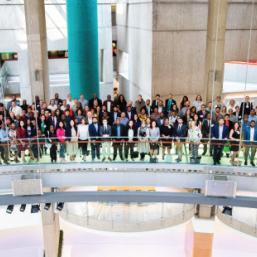
In July, more than 250 local elected officials, community leaders, and policy and labor partners from across the country gathered in Detroit for the largest, most diverse, and most powerful Local Progress (LP) convening to date. Detroit Councilmember Raquel Castañeda-López and Detroit Action Executive Director Branden Snyder welcomed LP with open arms and were instrumental in ensuring that the convening was rooted in partnership between the people of Detroit and their local government.
Local Progress, a network of progressive elected officials and a project of CPD, gathered to discuss “Equity. Justice. Power.” This wasn’t just a theme. It was a call to meet the challenge of moving local policy and action that dismantles systems of oppression designed to exclude people of color. This year’s convening focused on building power, courage, and creativity to tackle the crises of our time—homelessness, mass incarceration and disinvestment, targeting of immigrants, or runaway inequality.
In every plenary, breakout workshop, Detroit site visit, and interaction, elected officials grappled with how to overcome political, structural, and institutional barriers to an agenda of racial equity. For each of the topics—from the 2020 U.S. census to local government budgets to media strategy—moderators, speakers, and participants reckoned with the past and present of how localities have entrenched racism and exclusion, as well as how to take them on and win. Participants had tough conversations and made a plan to support each other as they all headed back to their own jurisdictions.
Local Progress also honored two LP members for their work in the last year. LP proudly awarded Balsz School District Board President Channel Powe of Arizona the "Network Builder Award" for her tremendous leadership in bringing new members into Local Progress, building deep relationships, and helping shape LP’s school board and racial justice work. Local Progress members also voted Seattle Councilmember Teresa Mosqueda the "Ady Barkan Progressive Champion" for her commitment to building progressive power through the Domestic Worker Bill of Rights, her cross-city leadership around corporate accountability, and her leadership on progressive housing policy.
The Local Progress network wouldn’t thrive without the commitment of members across the country who make it a space where people learn from each other, collectively take on the greatest challenges in our communities, and develop an agenda that we know will impact both state and federal policy. Together, we can build a world in which all of our communities have the freedom to thrive. Please consider making a donation to support the critical work of Local Progress and our affiliates today.
The end of July marked the beginning of a crucial time for the Medicare for All movement: the start of Congress’ August Recess. From July 29 to September 8, Congress will be home in their districts, holding community events, attending BBQs and parades, and more.
It’s also the time when healthcare fighters can directly meet them face-to-face and demand a health care system that respects the inherent dignity and value of all of us. Volunteers across the country are kicking off a month of action to capitalize on this opportunity.
People's Assembly in Brooklyn
On August 8th, CPD worked with National Nurses United, DSA, Our Revolution and others - with support from New York Communities for Change and Make the Road NY - to host People’s Assemblies in Brooklyn, New York and Long Branch, New Jersey. The NJ event was organized by Our Revolution Monmouth and co-sponsored by the New Jersey Universal Healthcare Coalition.
The groups brought out over 150 people, who shared their stories and worked collectively to develop a plan to win more Congressional support for Medicare for All while they are home for the recess.
“Not only are we pressuring our elected officials to support Medicare for All as the only proposal that takes profiteering out of the healthcare system, but we’re raising this as a racial justice issue! Over half the people who are without insurance are Black and Brown people between the ages of 26-64. Having a plan that would include them is something that we tremendously need.” said Darius Gordon, CPD National Field Organizer, who facilitated the Brooklyn assembly that targeted Rep. Hakeem Jeffries. At the assembly, participants coordinated direct phone calls and a Twitter storm at Jeffries calling for him to sign on as Medicare for All cosponsor.
People's Assembly in New Jersey
The events are part of a national series of People’s Assemblies on Medicare for All, with hundreds of similar gatherings happening across the country for the next few weeks.
“Medicare for All has a groundswell of support but there’s a lot of work to do to move these elected officials who still have not cosponsored yet. These People’s Assemblies display how we come together in solidarity and fight to make healthcare a right of all people!” said Julia Peter, CPD Director of Innovations Management.
Interested in joining a M4A People’s Assembly near you? Find one on the map today and RSVP! And help spread the word and invite others to join!
Together, we can win!
For press inquiries about this event or upcoming Medicare for All work, please contact Trisa Taro (ttaro@populardemocracy.org).
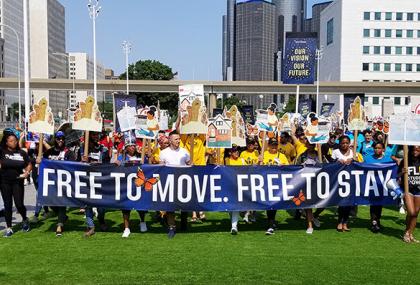
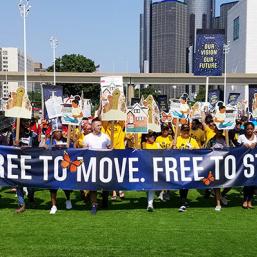
If there is one event that encapsulates what the Center for Popular Democracy Network is, it’s the People’s Convention. Last week, 1,800 grassroots leaders, organizers, elected officials, movement artists and leading national progressive voices made the trip to Detroit, Michigan for two days of transformational learning, action, and collective power-building. CPD Network affiliates and their members boarded buses, planes, and trains to unify and animate our bold and imaginative commitment to a popular democracy— collective decision-making, conversations across differences, and fearless visioning of a future where we all have the freedom to thrive. Read about the event in Michigan Advance, Detroit Metro Times, Fox 2 Detroit, and The Detroit News. Check out photos of the event here!
During the convention, CPD’s sister organization CPD Action worked with our network to unanimously ratify a network-wide federal platform that, for the first time, leverages the state and local power of the CPD Network into a combined issue-based platform for federal advocacy. It includes visionary policies and principles designed to stop the extraction of wealth from our communities and the corruption of our democracy, and calls for redress for historic policy decisions that maintain and reinforce structural inequality, and to guarantee fundamental human rights for all.
CPD organizers and affiliate leaders conducted intense workshops and skill-building sessions with top experts around campaign themes and communications practices, and we took to the streets in Detroit with a peaceful and powerful march and canvass operation. Together, we built community to create the fiercest organizing force this country has ever seen. we will need it to meet and beat the historic challenges we face.
CPD is grateful to all of our affiliates for joining us in Detroit. We especially want to thank Detroit Action for welcoming the CPD Network to their hometown. CPD would also like to thank our generous sponsors: JPB Foundation, Communications Workers of America, Resource Generation, Democrats.com, Working Families Party, ActBlue, United Automobile Workers, Friends of the Brooklyn Queens Connector, and People’s Action.
The People’s Convention demonstrated that popular democracy is beautiful. We’re making shared decisions about how we build a future of collective liberation and modeling the world that we want to create: one where all people can participate fully and freely in our economy, government, and society. Join us to support our network—53 affiliates across 131 cities in 34 states, Puerto Rico, and the District of Columbia—to center and activate the communities most impacted by injustice and inequity. Please make a meaningful donation today!
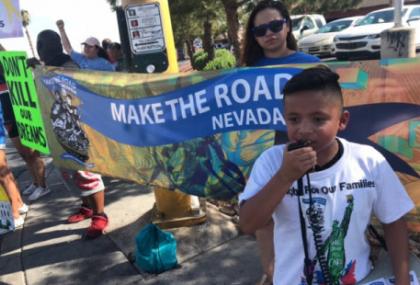
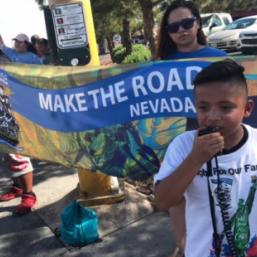
Launched less than two years ago, Make the Road Nevada (MRNV) has already made a big impact. MRNV has worked hard to develop a strong membership base, cultivate community leaders, and build its collective power. In Nevada’s 2019 legislative session, this grassroots movement translated into a stunning series of progressive policy wins in the areas of economic and housing justice, and youth and immigrant rights.
For workers, MRNV anchored Time to Care Nevada, a statewide economic justice coalition which led the campaign to successfully pass the state’s first paid sick days legislation. This legislation grants employees at businesses with 50 or more employees five days of earned paid sick time a year. Over 400,000 workers across the state are expected to benefit from this legislation. MRNV also helped spearhead the successful effort to increase the minimum wage, bringing it up to $12 an hour over five years, beginning in January 2020. This is the first increase to the state’s minimum wage in over a decade.
On immigrant justice, MRNV partnered with the Nevada Immigrant Coalition to pass statewide legislation that will allow workers to become certified in more than 50 professions, regardless of their legal status. This will provide immigrant families with a pathway to stable jobs and professions. MRNV also worked to pass statewide legislation that will allow former residents of Puerto Rico and other U.S. territories to use their ID card to obtain a Nevada driver’s license. This removes a significant hurdle for residents, many of whom were displaced by Hurricane Maria, to establish roots in their new home. MRNV also played a leading role in the creation of a new state agency, the Office of New Americans, which will assist with immigrant integration across Nevada. Make the Road NV youth leaders continue to lead efforts to end the school-to-deportation pipeline by passing a restorative justice bill and a statewide discipline data transparency bill.
Please join us in congratulating MRNV on these transformational wins! CPD will continue to support our network’s efforts at the state and federal levels to build the power of immigrant and working class communities to achieve dignity and justice. ¡Sí se puede!



